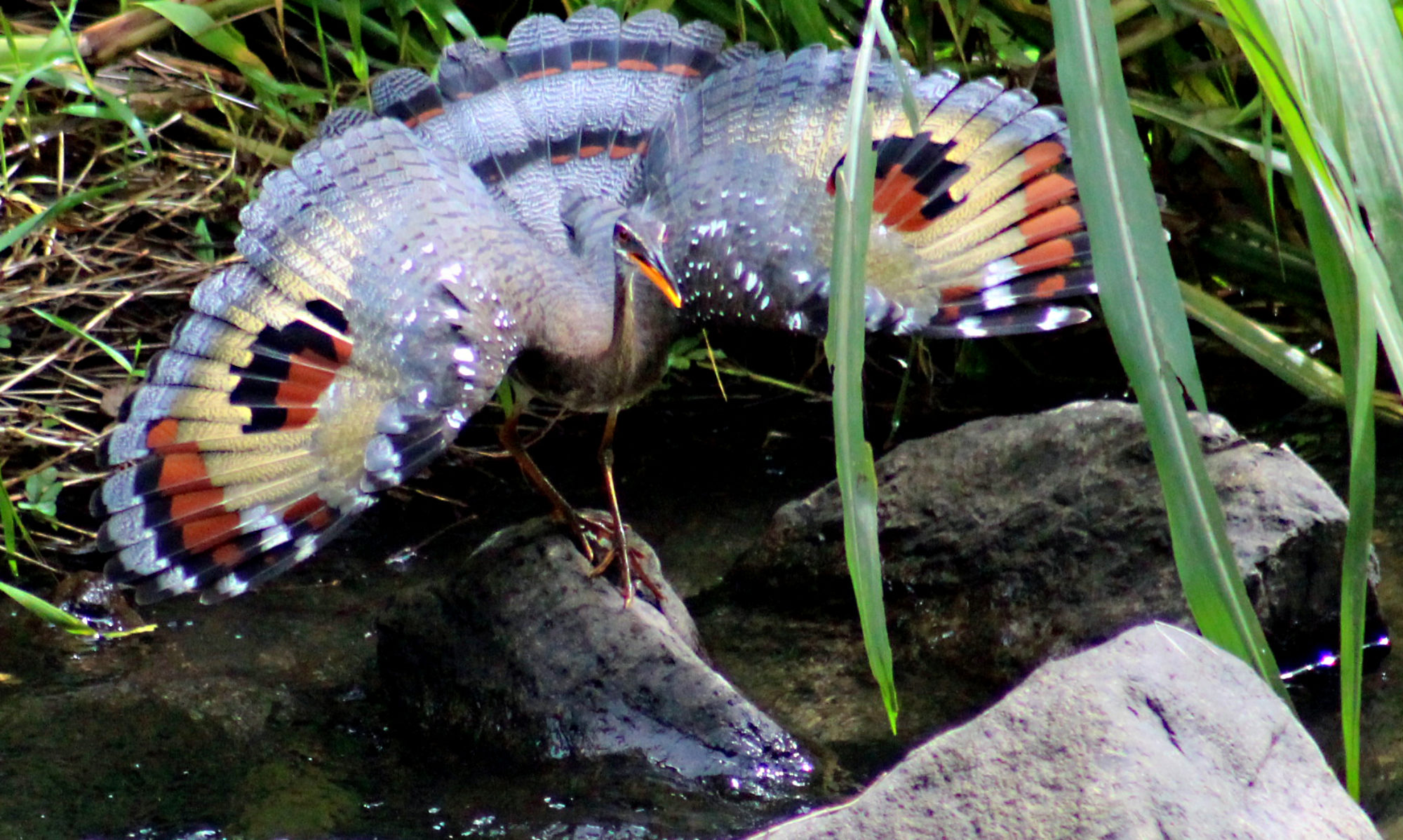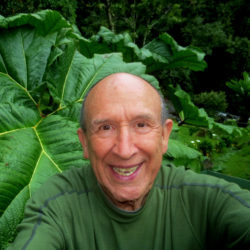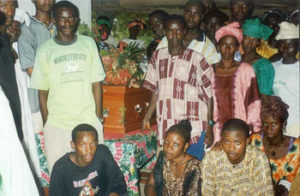Funeral Day Description by Burris Devanney
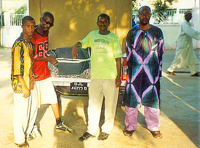
The burial of Steve Jones took place on Wednesday, November 7 at Bird Safari Camp between 5:00 and 7:00 PM as planned. The Nova Scotia – Gambia Association’s new Nissan Pick-up Truck served as the hearse, conveying Steve’s body from the mortuary of the Royal Victoria Hospital to Janjanbureh, a 300 kilometer trek. It seemed fitting that the “hearse” was white, as white is the usual color of mourning in Africa. We picked up Steve at 8:00 AM at the mortuary. (See the guys who tied it down at right.) He was in a simple wooden coffin, with a light pine-like veneer. Geri had provided a mattress to place under the coffin and we strapped it firmly in place for the rough ride ahead and zippered up the Nissan’s tarpaulin cover.
I drove the truck and was accompanied by my wife Louanne, Geri Mitchell and Geri’s friend Linda, who works at Abuko Nature Reserve. We were all friends of Steve, and had all spent pleasurable days and evenings at Bird Safari Camp in lively conversation with him. Another good friend of Steve’s, Charlie Doggett, a Baptist Missionary from Tennessee, drove behind us in second pick-up (also a Nissan), accompanied by two Gambian employees of Bird Safari Camp and one employee of Geri’s Safari Garden Hotel.
The highway was as treacherously pot-holed and wretchedly broken up as I have seen it over the past 19 years. We evaded most of the deeper trenches, often by driving along the sandy shoulder of the road, but we were jolted by more than a few unseen ruts both on the road and off. The coffin was well strapped in and never moved out of place. Geri had arranged a lunch and in the early afternoon we stopped in the shade of some high trees along the highway a few kilometers beyond Soma and ate cheese and tuna sandwiches, and washed them down with warm water.
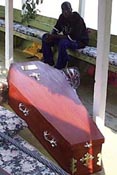 We arrived in late afternoon at Sankulay Kunda, the ferry crossing for Janjanbureh. Dawda (David, as Steve liked to call him) was waiting at the terminal, with Bird Safari’s large new (“pre-used”) pirogue (still named after the Senegalese
We arrived in late afternoon at Sankulay Kunda, the ferry crossing for Janjanbureh. Dawda (David, as Steve liked to call him) was waiting at the terminal, with Bird Safari’s large new (“pre-used”) pirogue (still named after the Senegalese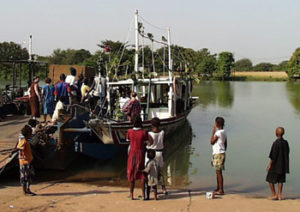 super-star Youssou Ndour) waiting in mid stream. We drove onto the small ferry and began unstrapping Steve’s coffin. The pirogue approached, adorned on both decks with green leafy branches, and pulled up alongside the ferry. By now several staff members of Bird Safari were on hand to help move Steve onto the pirogue and accompany him on a last journey around the island.
super-star Youssou Ndour) waiting in mid stream. We drove onto the small ferry and began unstrapping Steve’s coffin. The pirogue approached, adorned on both decks with green leafy branches, and pulled up alongside the ferry. By now several staff members of Bird Safari were on hand to help move Steve onto the pirogue and accompany him on a last journey around the island.
Charlie and I and Louanne took the trucks across on the ferry and drove through the slumbering streets and crumbling relics of colonial Georgetown. We stopped at the Bird Safari office at the junction of Owen Street and the south ferry highway, where we loaded both vehicles, front and back, with more staff and an unknown number of youths from the town, then trucked the rutted track through the bush to the Camp. On the way we passed the forlorn, overgrown colonial cemetery which Steve had tried to convince the British High Commission to rehabilitate as a historic site. We also passed over the culvert where just thirteen days earlier I had watched Steve carefully empty a bag of toads, captured around the camp, into the lush rice fields.
We reached the Camp and learned that a party of a dozen tourists who had checked in at lunch time had just departed across the river on the “Safari Queen”, from there to take a bus to the Stone Circles at Wassau. They were
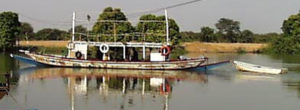
due to return at 7:00 PM for dinner and to spend the night. The staff was determined that the tourists not be present for the funeral (as they wanted no outsiders involved in their personal farewell to Steve) and determined as well that the tourists not even be aware that a burial was taking place on the grounds. In this endeavour, careful preparation, privacy, pride in one’s work, respect for the dead, timing and confidence were fully commingled.
Louanne, Charlie and I checked into out tents along the river some forty-five minutes before the pirogue was heard chugging slowly upstream toward us. In the meantime, clusters of citizens of Janjanbureh began arriving on foot, a nine kilometre trek from the town. There was no lack of pall bearers to move Steve from the boat to the wrap-around, collonaded stoep of the main building of the Camp, where well over a hundred employees and townsfolk were quietly waiting.

The coffin was placed on a pair of tables pushed together and covered with tablecloths. Two beautiful (and large) flower arrangements prepared by Suelle, a Gambian artist, and another large bouquet from the staff of the Janjanbureh Safari Camp, the cross river “rival”, were placed with the coffin.
Some staff members expressed a wish to see Steve for the last time. Charlie Doggett consulted a number of persons close to Steve and it was agreed that the lid of the coffin would be opened. Charlie and Dawda announced in two languages to those assembled that it was often the custom at Christian funerals that family and friends be given the opportunity to view the deceased. They said that, although this was not usually done in The Gambia, especially in Muslim funerals, the coffin would be opened for a few minutes so that anyone who wished to see Steve one last time could do so. The lid of the coffin was in one piece and when it was removed Steve was seen in the black slacks and open necked white shirt which he often wore to dinner at the Camp. But he was barefoot! Which had not been the embalmer’s intention, as the shoes were in the coffin, but somehow it seemed appropriate, and, well . . . like him. What I saw then, and see still in my mind’s eye, is strength, resolution, though I did not see those qualities as foremost in Steve’s character (though not lacking) when he was alive.
There followed a remarkable few minutes in which almost everyone present, instead of queuing up and filing past the deceased, as in a “western” funeral parlour, came and stood in a huge semi-circle around the coffin, utterly subdued and respectful, as if bonded by silence to one another and to Steve in the centre. They stood like this for six or seven minutes. Standing beside me, one very small boy of about 15, Lamin, who worked part time for Steve, had tears welling over in silence. He put his arm around my waist and his head into my chest. A number of others also had silent tears. Most were quietly somber and deeply touched.
 When people moved away we replaced the lid, and the pall bearers followed by all the mourners, carried the coffin to the burial site in a small clearing among the trees. The grave had been well prepared, framed in thick cement on the bottom and four sides. (Staff had, of course, carried out all preparations themselves.) The throng circled the grave, several persons deep. Charlie Doggett conducted the service with a mix of formal and informal ceremony. After the scripture reading by Geri, Charlie invited the Chief of the town, Bakary Jow, to say a few words about Steve — which he did with eloquence. Perhaps about 15 persons, “Georgetonians” and employees of the Camp, also stepped forward to speak about their relationship with Steve. Everything was personal and dignified, respectful and true.
When people moved away we replaced the lid, and the pall bearers followed by all the mourners, carried the coffin to the burial site in a small clearing among the trees. The grave had been well prepared, framed in thick cement on the bottom and four sides. (Staff had, of course, carried out all preparations themselves.) The throng circled the grave, several persons deep. Charlie Doggett conducted the service with a mix of formal and informal ceremony. After the scripture reading by Geri, Charlie invited the Chief of the town, Bakary Jow, to say a few words about Steve — which he did with eloquence. Perhaps about 15 persons, “Georgetonians” and employees of the Camp, also stepped forward to speak about their relationship with Steve. Everything was personal and dignified, respectful and true.
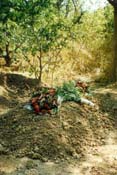 When it was over, and the coffin had been lowered into the grave and the earth mounded on top and the flowers laid, everyone turned quietly away. The good citizens of Janjanbureh began the long walk home as dusk began to fall. Many of them came and shook hands with Louanne, Geri, Charlie, Linda and me, and with Dawda and staff, making us a kind of receiving line, as if we were family. And I think we were.
When it was over, and the coffin had been lowered into the grave and the earth mounded on top and the flowers laid, everyone turned quietly away. The good citizens of Janjanbureh began the long walk home as dusk began to fall. Many of them came and shook hands with Louanne, Geri, Charlie, Linda and me, and with Dawda and staff, making us a kind of receiving line, as if we were family. And I think we were.
As the townsfolk disappeared into the path through the bush, the rest of us made our way back to the dining room and ordered drinks at the bar. Hardly had we taken our first sip when the tour group trooped in from Wassau. Dinner was served on time, and was delicious as usual. Next morning the tourist left without an inkling of what had transpired the afternoon before. Steve would have been impressed!
Burris Devanney
17 November 2001
A THANK YOU NOTE FROM STEVE’S FAMILY IN ENGLAND
We have just received the account of Steve’s funeral from Burris Devanney. We as a family cannot believe the trouble and thought put in to making the funeral such a unique event. It was something Steve would have thoroughly appreciated from beginning to end. It was done with such dignity and a lot of hard work must have gone into it. We could almost hear Steve giving us the account of it himself, he would have been so pleased to have had so many of his good friends and staff take such care over what must have been a very sad day.
We would like to thank Burris, Louanne, Geri, Maurice, Charlie, Linda and Dawda (David) and all the staff for making this such a special occasion. Thank you all of Steve’s new found family in Gambia.
Ray, Elizabeth and family.
21 November 2001
Menu – Steve Jones Funeral
- Home
- Colorful Description (You are on this page)
- Funeral Message
- Friend’s Tributes
